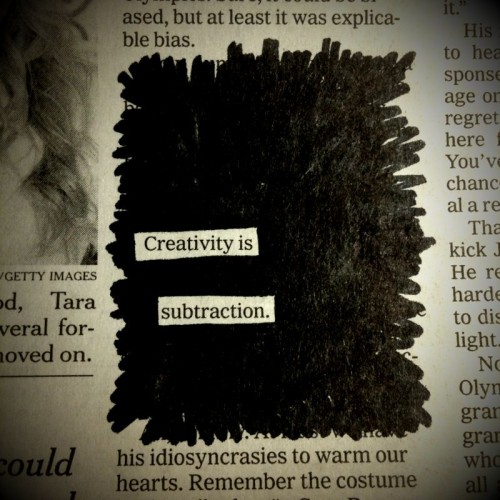
I’ve long been inspired by the punk band Wire’s rules of negative self-definition: “No solos; no decoration; when the words run out, it stops; we don’t chorus out; no rocking out; keep it to the point; no Americanisms.”
In How Music Works, David Byrne writes about the early style of the Talking Heads playing CBGBs as a three-piece combo, how “it was less a band than an outline for a band,” and how they, too, defined themselves against the “overwhelming” sense of what had come before:
The only sensible course was to avoid all of it, to strip everything back and see what was left. Some others in that scene had similar ideas. The Ramones didn’t allow guitar solos, for example, but we took reductionism pretty damn far. It was a performance style defined by negatives—no show-offy solos… no rock moves or poses, no pomp or drama, no rock hair, no rock lights (our instructions to club lighting people were “Turn them all on at the beginning and turn them off at the end”), no rehearsed stage patter (I announced the song titles and said “Thank you” and nothing more), and no singing like a black man. The lyrics too were stripped bare. I told myself I would use no clichéd rock phrases, no “Ohh, baby”s or words that I wouldn’t use in daily speech, except ironically, or as a reference to another song.
It was mathematics; when you subtract all that unwanted stuff from something, art or music, what do you have left? Who knows? With the objectionable bits removed, does it then become more “real”? More honest? I don’t think so anymore. I eventually realized that the simple act of getting on stage is in itself artificial, but the dogma provided a place to start. We could at least pretend we had jettisoned our baggage (or other people’s baggage, as we imagined it) and would therefore be forced to come up with something new.
In Jonathan Gould’s “The Origin Story of ‘Stop Making Sense,” he writes about how director Jonathan Demme defined his film of the band by what he wasn’t going to do:
Demme made it clear that he wanted to focus the whole production solely on the band’s performance. Unexceptional as this might sound, it was a departure from the way that rock concerts had previously been presented on film, from Richard Lester’s mock-documentary “A Hard Day’s Night” to Martin Scorsese’s “The Last Waltz,” by dispensing with a “backstory” of the musicians coming and going; the logistics of staging the show; interviews with the band members, promoters, and fans; and the fervent response of the crowd. Instead, Demme proposed to simply film the band onstage, expertly, while avoiding the rhythmic, fast-paced, jump-cut style of editing associated with the music videos being shown on the recently established platform MTV.
In Rob Walker’s recent newsletter, “‘No’ Rules,” he talks about how extreme self-imposed constraints can spur creative leaps and your signature work. (Rob has an assignment he gives to students, “Always/Never,” in which he has his students make a list of 3 things their work must always do, and 3 things their work must never do.) But, Rob says, you are totally within your rights to eventually break your own rules and start subtracting the subtractions.
In fact, it might be crucial to your artistic survival to break your own rules. Jonathan Gould points out that while Jonathan Demme took a minimalist approach, by the time Stop Making Sense came around the Talking Heads had “jettisoned many of the musical and theatrical restrictions they had originally placed on themselves.”
Rob pointed out their amazing Live in Rome concert from 1980 as an example of the great leaps they had already made in just a few years:
You can see the same progression with a band like The White Stripes — at first, they began with their extreme constraints of threes: voice, guitar, drums; red, white, black, etc. Slowly, they broke their own rules, added in other instruments on later albums, expanding their sound. (Their biggest single, “Seven Nation Army,” was radical at the time because they included a bass line! Okay, so it wasn’t actually a bass line, it was Jack White’s guitar tuned down an octave with a whammy pedal, but everybody thought it was a bass, so it seemed like they were breaking their rules…)
I love this idea of subtraction and addition, contraction and expansion, breaking your own rules…
(Thanks to Rob for all this — subscribe to his newsletter and buy The Art of Noticing! Here’s an interview between the two of us.)






